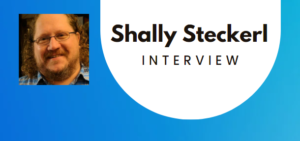I had the opportunity to interview the legendary Shally Steckerl about talent sourcing. He’s definitely a leader in our space and I was overjoyed when he finally allowed me to conduct a full interview. He just recently wrote a new book about sourcing called The Sourcing Method. So, I recommend checking out that book and I hope you enjoy reading this interview.
The Legend of Shally
Shally Steckerl is a well-known figure in the recruiting and sourcing industry. He is the founder of The Sourcing Institute, a training and consulting organization that provides sourcing education to recruiters and sourcers worldwide. He is also the creator of the “Shally Method,” which is a sourcing strategy that involves using Boolean strings and other advanced search techniques to find passive candidates. He has more than 20 years of experience in the recruiting industry and is considered a thought leader in the field of sourcing and recruiting. He has been invited to speak at many conferences and events about sourcing, recruiting, and talent acquisition topics.
How did you get into talent sourcing?
SS: In 1996, I had just returned from a two-year tour of duty in the US Peace Corps and was desperate for a job. After a frustrating (and instructive) four-month search, I blundered into the business of finding talent. Interestingly enough or not, it began by winning a local pool tournament. With less than a few dollars in my pocket, my old college roommate and I entered into a local competition hosted by the Atlanta Newcomers. I can’t even recall the name of the pool hall and have never visited it again, but I do remember that dozens of teams competed to win a grand prize of $200. For me, the purse held the promise of enough gas money to get back to my mom’s home in Florida.
The last match of the tournament had us pitted against a British couple, both of whom were so confident in their game and so fluent in back-handed compliments that it only fueled our desire to drag the game on as long as possible and make them look bad. During all that, I got to know both players and conversation soon shifted to the inevitable what-do-you-do chatter.
To my surprise, they explained that they ran an “agency” that helped companies find talent for hard to fill jobs, and they were paid an “obscene amount in commissions” for that service. Having found it extremely difficult to obtain meaningful employment myself despite having a dual Bachelor of Science degree from a good school, I was aghast at what only seemed to me a shady scam of a business. And promptly raised my hand with interest. An invitation for an informal interview back at their office the following Monday lead me to take a chance on them, and them on me, and became my first day on the job circa October ‘96.
You recently wrote a new book – what is it about?
SS: In a nutshell, it is my life’s work, all neatly packaged in an easy to follow step-by-step workflow anyone can follow to become a successful sourcer. It is a clear roadmap to healthy, sustainable hiring practices that do not engender ill will, either from the candidate pool (by ignoring basic human dignities and treating them like cattle) or from the hiring authority (through inattentiveness, ineffectiveness, and inefficiency.) It is what I have spent my career building, a way to fix the recruitment process, to extract it from the morass of its industrial-era roots, to facilitate its evolution to meet modern demands. Contained within the pages of my book is the most effective, efficient and sustainable way to find and engage talent.
You’ve spoken at a lot of conferences – which one was your favorite?
SS: This is unfair! I have spoken at hundreds of conferences. I’ll say Recruiting Trends continues to amaze me because of the sheer variety of audience members. I have meet recruiters from the CIA, NSA, police departments, universities, and every imaginable industry sector. And also SOSU in Amsterdam was way more fun than I anticipated. It re-awoke a sense of wonder and curiosity in me. It’s probably because I’m such an intercultural geek – my dream is to get a Ph.D. in semiotics – I found myself listening to people from widely diverse perspectives all express some of the same “talent sourcing” problems we have in the USA but also new ones I had never even imagined existed.
Future predictions on sourcing. What will change in the next 5 years?
SS: I think outreach will become more personalized and individualized and, as technology evolves, recruiters will need to become something of a project manager in order to get organized with their processes. Project management for sourcing is absolutely key; a tool to help recruiters with this doesn’t yet exist but it would be the holy grail if it did.
Organisations will have to realise that they need to spend real money to provide truly measurable outcomes from training, not just rely on them to learn on their own by watching “eye candy” videos and going to free webinars sponsored by vendors because sourcing it’s just something that you can learn organically all by yourself anymore. In the recruiting industry, in general, there isn’t an emphasis on doing this. They feel like recruiters should come to the job prepared, knowing how to do it, even though they are hiring more and more entry-level inexperienced recruiters.
Favorite Extension Tool?
Seekout.io is my favorite extension on the market.
Favorite Boolean string?
Boolean is dead. Long live natural language phrases!
Any Causes that you really care about?
Yes, I really care about my Souricng Foundation. This is important, it’s how we can give back to the community and make a long-term difference in our industry way beyond the short time of our career.
Recommended Reading:
Boolean Hacks to Source Diverse Talent
How to Use Evernote as a Recruiting ATS
Review of Vettery a Marketplace Hiring Platform
- AI Search Will Transform Talent Sourcing Forever - January 10, 2025
- Build an AI Sourcing Assistant using ChatGPT 4 - January 10, 2025
- Top Recruiting Leaders to Follow in 2025 - January 8, 2025


Shally congrats. Still at the top of your game and our industry. I am proud of you.